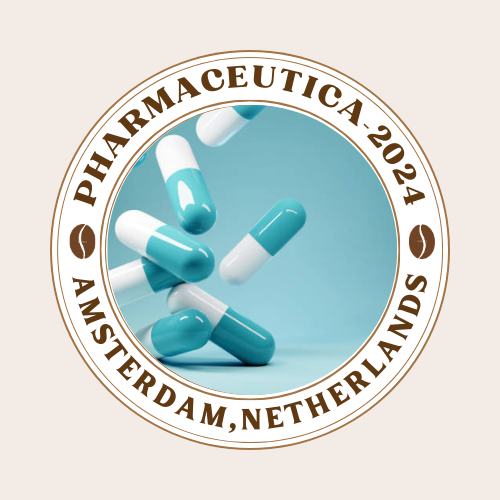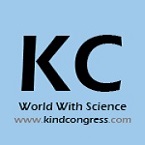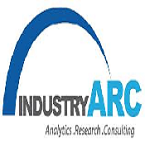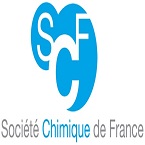Renowned Speakers

Sangram Raut
University of North Texas Health Science Center USA

Yavuz Selim Silay
Istanbul Consulting Group Turkey

Nirupama Sabnis
University of North Texas Health Science Center USA

Amer Abdelgany
University of science and technology Canada

Divya Sivanesan
Indian Institute of Technology India

Yavuz Selim Silay
Istanbul Consulting Group Turkey

Vinod Labhasetwar
Lerner Research Institute USA

Sameer Alshehri
University of Nebraska Medical Center USA
Recommended Global Pharmaceutical Sciences Webinars & Conferences
Europe & UK
Asia Pacific & Middle East
Canada
Pharmaceutica-2024
About Conference
The 3rd International Conference and Expo on Pharmaceutics & Novel Drug Delivery Systems is a highly anticipated conference scheduled to take place on April 11-12,2024, in Amsterdam, Netherlands. This prestigious event will bring together renowned researchers, industry professionals, and experts in the field of pharmaceutics and drug delivery systems. The conference aims to provide a platform for exchanging knowledge, sharing the latest advancements, and discussing emerging trends in drug delivery technologies. Attendees can expect a diverse range of presentations, interactive sessions, and poster presentations covering various topics such as nanotechnology-based drug delivery, targeted therapy, controlled release systems, and personalized medicine.
Pharmaceutica 2024 will offer a unique opportunity for networking, fostering collaborations, and exploring potential partnerships among participants from academia, pharmaceutical companies, regulatory agencies, and related industries. Attendees will have the chance to engage in insightful discussions, gain new perspectives, and enhance their understanding of cutting-edge research and innovative drug delivery approaches.
Amsterdam, a vibrant and cosmopolitan city known for its rich scientific heritage, serves as the ideal backdrop for this conference. Participants will not only benefit from the conference sessions but also have the opportunity to explore the city's cultural attractions, historical landmarks, and renowned scientific institutions. The Expo on Pharmaceutics & Novel Drug Delivery Systems promises to be an exceptional gathering of professionals shaping the future of drug delivery. It is a must-attend event for those seeking to stay updated with the latest advancements in the field and contribute to the advancement of pharmaceutics and novel drug delivery systems.
Scientific Sessions
Session on Nanotechnology in Drug Delivery: Advances and Applications
Nanotechnology has revolutionized the field of drug delivery, offering remarkable advancements and applications. This session will focus on the latest breakthroughs and cutting-edge research in the field of nanotechnology-based drug delivery systems. Nanoparticles, such as liposomes, polymeric nanoparticles, and dendrimers, enable precise control over drug release, enhanced drug stability, and targeted delivery to specific sites in the body. The session will explore the design, synthesis, and characterization of these nanocarriers, as well as their interactions with biological systems. Moreover, the session will highlight the applications of nanotechnology in various therapeutic areas, including cancer treatment, infectious diseases, regenerative medicine, and central nervous system disorders. Attendees will gain insights into the development of nanomedicines, the optimization of drug loading and release kinetics, and strategies to overcome biological barriers for efficient drug delivery.
The session will also delve into the safety and toxicological considerations associated with nanotechnology-based drug delivery systems. Discussions on biocompatibility, immunogenicity, and long-term effects will provide a comprehensive understanding of the translational potential of nanomedicine. Overall, this session on nanotechnology in drug delivery will showcase the latest advances and explore the vast potential of nanocarriers in improving therapeutic outcomes, enhancing patient compliance, and revolutionizing the future of medicine.
Session on Targeted Drug Delivery Systems: Precision Medicine Approaches
Targeted drug delivery systems have emerged as a promising approach in precision medicine, offering the potential for personalized and more effective therapeutic interventions. This session will focus on the advancements and applications of targeted drug delivery systems in achieving precision medicine goals. Targeted drug delivery involves the use of specialized carriers or vehicles to selectively deliver drugs to specific cells, tissues, or organs, while minimizing off-target effects. The session will explore various targeting strategies, including ligand-receptor interactions, antibody-drug conjugates, and stimuli-responsive systems.
Attendees will gain insights into the design and engineering of targeted drug delivery systems, including nanoparticles, liposomes, and micelles. Discussions will cover topics such as surface modification, release kinetics, and strategies for overcoming biological barriers. The session will also highlight the potential clinical applications of targeted drug delivery in different therapeutic areas, such as oncology, immunology, and neurology. The ability to precisely deliver therapeutic agents to diseased cells or tissues holds great promise for improving treatment outcomes and reducing systemic toxicity.
Furthermore, discussions on the challenges and future directions of targeted drug delivery systems will provide valuable insights into the development and translation of precision medicine approaches. Overall, this session on targeted drug delivery systems will provide a comprehensive overview of precision medicine approaches, highlighting the potential for personalized therapies and improved patient outcomes. It will serve as a platform for researchers, clinicians, and industry professionals to exchange knowledge, foster collaborations, and shape the future of targeted drug delivery in precision medicine.
Session on Controlled Release Systems: Enhancing Drug Efficacy and Safety
Controlled release systems have revolutionized drug delivery by providing a means to enhance drug efficacy while ensuring patient safety. This session will focus on the advancements and applications of controlled release systems in improving therapeutic outcomes. Controlled release systems enable the sustained and controlled release of drugs over an extended period, ensuring optimal drug concentrations at the target site. The session will explore various strategies for achieving controlled release, such as matrix systems, reservoir systems, and microencapsulation. Attendees will gain insights into the design, formulation, and characterization of controlled release systems, including factors influencing drug release kinetics and release mechanisms. Discussions will cover advancements in materials science, polymer engineering, and nanotechnology that contribute to the development of effective controlled release systems. Moreover, the session will highlight the clinical applications of controlled release systems across various therapeutic areas, including cardiovascular diseases, cancer, and chronic pain management. The ability to maintain therapeutic drug levels while reducing dosing frequency can improve patient compliance and minimize adverse effects.
Discussions will also address regulatory considerations, safety profiles, and biocompatibility aspects of controlled release systems, ensuring their suitability for clinical use. Overall, this session on controlled release systems will showcase the latest advancements and explore the potential of these systems in enhancing drug efficacy, improving patient outcomes, and ensuring safety in drug delivery. It will serve as a platform for researchers, clinicians, and industry professionals to exchange knowledge, discuss challenges, and shape the future of controlled release systems.
Session on Novel Drug Delivery Systems for Biologics and Gene Therapy
Novel drug delivery systems have revolutionized the field of biologics and gene therapy, enabling the effective delivery of these complex therapeutics. This session will focus on the advancements and applications of novel drug delivery systems specifically designed for biologics and gene therapy. Biologics, such as monoclonal antibodies, proteins, and nucleic acids, hold great promise for the treatment of various diseases. However, their large size, susceptibility to degradation, and limited stability present challenges in delivery. The session will explore innovative approaches, including nanoparticle-based systems, viral vectors, and lipid-based carriers, to overcome these hurdles and enhance the delivery of biologics. Gene therapy, with its potential to treat genetic disorders by introducing therapeutic genes, requires efficient and targeted delivery systems. The session will discuss viral and non-viral vectors, gene editing technologies, and innovative gene delivery platforms to facilitate safe and effective gene therapy.
Attendees will gain insights into the design, formulation, and optimization of these novel drug delivery systems for biologics and gene therapy. Discussions will cover topics such as stability, scalability, immunogenicity, and regulatory considerations. The session will also highlight the clinical applications and therapeutic breakthroughs made possible by these novel drug delivery systems, providing a platform for researchers, clinicians, and industry professionals to exchange knowledge, foster collaborations, and shape the future of biologics and gene therapy delivery.
Session on Smart Drug Delivery Technologies: Sensors and Intelligent Release Systems
Smart drug delivery technologies have revolutionized the field of drug delivery, offering precise control over drug release and the ability to monitor therapeutic outcomes. This session will focus on the advancements and applications of smart drug delivery technologies, specifically those incorporating sensors and intelligent release systems. Smart drug delivery systems utilize sensors to monitor physiological parameters, biomarkers, or drug levels in real-time. The session will explore the integration of sensors into drug delivery devices, enabling personalized and adaptive therapy. Discussions will cover topics such as implantable sensors, wearable devices, and advancements in biosensors for drug monitoring. Intelligent release systems, such as stimuli-responsive polymers or controlled-release microchips, allow for on-demand drug release based on specific triggers or conditions. The session will highlight the design, development, and optimization of these intelligent release systems, providing insights into the release mechanisms and triggering stimuli. Attendees will gain insights into the potential applications of smart drug delivery technologies in various therapeutic areas, such as diabetes management, cancer therapy, and chronic disease treatment. The ability to precisely control drug release and tailor therapy to individual needs holds great promise for improving patient outcomes and treatment efficacy. Furthermore, discussions will address the challenges and future directions of smart drug delivery technologies, including regulatory considerations, scalability, and integration with digital health platforms.
Overall, this session on smart drug delivery technologies will showcase the latest advancements and explore the potential of these systems in revolutionizing drug delivery. It will serve as a platform for researchers, clinicians, and industry professionals to exchange knowledge, foster collaborations, and shape the future of intelligent drug delivery.
Session on Transdermal Drug Delivery: Innovations and Challenges
Transdermal drug delivery has emerged as a convenient and non-invasive route for delivering therapeutic agents through the skin. This session will focus on the innovations and challenges in transdermal drug delivery, exploring the advancements and potential solutions in this field. Transdermal drug delivery systems offer numerous advantages, such as sustained drug release, improved patient compliance, and reduced side effects. The session will delve into the design and development of transdermal patches, microneedle arrays, and other innovative delivery platforms for enhanced drug permeation through the skin. Attendees will gain insights into the formulation strategies, skin penetration enhancers, and technologies used to optimize drug release and permeation across the skin barrier. Discussions will cover advancements in materials science, microfabrication techniques, and formulation approaches for transdermal drug delivery systems.
The session will also address the challenges associated with transdermal drug delivery, including limited drug permeability, skin irritation, and variability in drug absorption. Discussions on innovative strategies to overcome these challenges, such as microneedle-based systems and novel permeation enhancers, will provide a comprehensive understanding of the field's advancements. Furthermore, regulatory considerations, safety profiles, and clinical applications of transdermal drug delivery will be discussed, ensuring the translation of innovative approaches to clinical practice. Overall, this session on transdermal drug delivery will showcase the latest innovations, explore the challenges, and discuss potential solutions in this field. It will provide a platform for researchers, clinicians, and industry professionals to exchange knowledge, foster collaborations, and shape the future of transdermal drug delivery.
Session on Lipid-Based Drug Delivery Systems: Formulations and Applications
Lipid-based drug delivery systems have gained significant attention in the field of pharmaceutical sciences due to their unique properties and versatility. This session will focus on the formulations and applications of lipid-based drug delivery systems, highlighting their potential in improving drug delivery and therapeutic outcomes. Lipid-based systems, such as liposomes, lipid nanoparticles, and solid lipid nanoparticles, offer advantages such as biocompatibility, stability, and the ability to encapsulate hydrophobic and hydrophilic drugs. The session will explore the design, characterization, and optimization of these lipid-based formulations, including factors influencing drug loading, release kinetics, and stability. Attendees will gain insights into the applications of lipid-based drug delivery systems in various therapeutic areas, including cancer therapy, gene delivery, and targeted drug delivery. Discussions will cover topics such as targeted liposomes, lipids for enhanced bioavailability, and lipid-based nanoemulsions for oral and parenteral delivery. Furthermore, discussions will address challenges associated with lipid-based systems, such as scale-up considerations, regulatory aspects, and stability during storage and transportation.
Overall, this session on lipid-based drug delivery systems will showcase the latest advancements and explore the potential of these systems in improving drug delivery, enhancing therapeutic efficacy, and addressing unmet clinical needs. It will serve as a platform for researchers, clinicians, and industry professionals to exchange knowledge, foster collaborations, and shape the future of lipid-based drug delivery.
Session on Biodegradable Drug Delivery Systems: Sustainable Approaches
Biodegradable drug delivery systems have gained significant attention in recent years as sustainable alternatives for drug delivery. This session will focus on the advancements and applications of biodegradable drug delivery systems, highlighting their role in sustainable approaches to healthcare. Biodegradable systems offer the advantage of controlled drug release while minimizing the accumulation of non-degradable materials in the body. The session will explore various biodegradable materials, including polymers, hydrogels, and microparticles, used in drug delivery systems. Discussions will cover their formulation, degradation mechanisms, and impact on drug release kinetics. Attendees will gain insights into the applications of biodegradable drug delivery systems in various therapeutic areas, including orthopedics, wound healing, and regenerative medicine. The session will also highlight the potential of these systems for localized and targeted drug delivery, minimizing systemic side effects. Furthermore, discussions will address the challenges and future directions of biodegradable drug delivery systems, including their stability, manufacturing scalability, and regulatory considerations. By focusing on sustainable approaches, this session aims to promote the development and utilization of biodegradable drug delivery systems, contributing to environmentally friendly and patient-centric healthcare practices.
Overall, this session on biodegradable drug delivery systems will showcase the latest advancements and explore their potential in sustainable drug delivery. It will serve as a platform for researchers, clinicians, and industry professionals to exchange knowledge, foster collaborations, and shape the future of biodegradable drug delivery systems.
Session on Personalized Medicine and Drug Delivery: Tailoring Treatment for Individual Patients
Personalized medicine, with its focus on tailoring treatment to individual patients based on their unique characteristics, has revolutionized healthcare. This session will explore the intersection of personalized medicine and drug delivery, highlighting the advancements and applications in this field. Personalized medicine aims to maximize treatment efficacy and minimize adverse effects by considering factors such as a patient's genetic makeup, lifestyle, and disease characteristics. The session will discuss how drug delivery systems can be customized to deliver therapies that match the specific needs of individual patients. Attendees will gain insights into the utilization of biomarkers, genetic testing, and diagnostic tools to identify patient subgroups and guide personalized treatment decisions. Discussions will cover the development of targeted drug delivery systems, companion diagnostics, and therapeutic monitoring approaches. The session will also address the challenges associated with personalized medicine and drug delivery, including regulatory considerations, cost-effectiveness, and scalability of personalized therapies. By integrating personalized medicine with drug delivery, this session aims to improve treatment outcomes, enhance patient satisfaction, and pave the way for more precise and effective healthcare interventions.
Overall, this session on personalized medicine and drug delivery will showcase the latest advancements and explore the potential of tailoring treatment for individual patients. It will serve as a platform for researchers, clinicians, and industry professionals to exchange knowledge, foster collaborations, and shape the future of personalized medicine in drug delivery.
Session on Nanomedicine and Nanotoxicology: Safety Considerations in Drug Delivery
Nanomedicine has emerged as a powerful tool in drug delivery, offering unprecedented opportunities for targeted therapy and improved treatment outcomes. However, the safety considerations associated with nanomaterials and their potential toxicity cannot be overlooked. This session will focus on the intersection of nanomedicine and nanotoxicology, highlighting the importance of safety considerations in drug delivery. The session will explore the design and engineering of nanomaterials for drug delivery, including nanoparticles, nanocarriers, and nanostructured biomaterials. Discussions will delve into the physicochemical properties of nanomaterials that influence their safety profile, such as size, surface charge, and surface functionalization. Attendees will gain insights into the principles and methodologies of nanotoxicology, including in vitro and in vivo evaluation of nanomaterials for potential adverse effects. Discussions will address factors such as biocompatibility, immunogenicity, biodistribution, and long-term effects. Furthermore, the session will highlight strategies to enhance the safety of nanomedicine, including surface modification, coating strategies, and the use of biocompatible materials. Regulatory considerations and guidelines for assessing the safety of nanomedicine in preclinical and clinical settings will also be discussed. By emphasizing safety considerations in nanomedicine, this session aims to ensure the responsible development and application of nanotechnology-based drug delivery systems, minimizing potential risks and maximizing therapeutic benefits.
Overall, this session on nanomedicine and nanotoxicology will showcase the latest advancements and explore the importance of safety considerations in drug delivery. It will serve as a platform for researchers, clinicians, and industry professionals to exchange knowledge, foster collaborations, and shape the future of safe and effective nanomedicine.
Session on Advances in Oral Drug Delivery Systems: Overcoming Barriers and Enhancing Bioavailability
Advances in oral drug delivery systems have transformed the field of pharmaceuticals by offering enhanced bioavailability and overcoming various barriers associated with oral administration. This session will focus on the latest advancements and strategies in oral drug delivery, highlighting approaches to improve drug absorption and bioavailability. Oral drug delivery is widely preferred due to its convenience, patient compliance, and non-invasiveness. However, challenges such as poor solubility, enzymatic degradation, and limited permeability can hinder drug absorption. The session will explore innovative formulation techniques, including nanoparticles, microparticles, and lipid-based systems, to overcome these barriers. Attendees will gain insights into strategies for enhancing drug solubility, optimizing release kinetics, and improving intestinal permeability. Discussions will cover topics such as prodrug approaches, formulation technologies, and novel excipients for oral drug delivery systems. Moreover, the session will highlight emerging technologies, including nanotechnology, 3D printing, and biodegradable materials, that offer promising solutions to enhance oral drug delivery. By addressing the challenges and presenting the latest advancements in oral drug delivery, this session aims to improve therapeutic outcomes, increase patient compliance, and drive innovation in the field.
Overall, this session on advances in oral drug delivery systems will showcase the latest innovations, explore strategies to overcome barriers, and promote the development of effective oral drug delivery systems. It will serve as a platform for researchers, clinicians, and industry professionals to exchange knowledge, foster collaborations, and shape the future of oral drug delivery.
Session on Inhalation Drug Delivery: Novel Approaches and Device Technologies
Inhalation drug delivery has gained significant importance as a targeted and effective route for delivering drugs to the respiratory system. This session will focus on the novel approaches and device technologies in inhalation drug delivery, exploring advancements in this field. Inhalation drug delivery offers several advantages, including rapid onset of action, direct targeting of the lungs, and avoidance of first-pass metabolism. The session will delve into innovative inhalation formulations, such as Dry Powder Inhalers (DPIs), Metered-Dose Inhalers (MDIs), and nebulizers, as well as advancements in device technologies. Attendees will gain insights into the design and development of inhalation devices, including considerations for optimizing drug delivery, ease of use, and patient compliance. Discussions will cover topics such as aerosol generation, particle size optimization, and improvements in inhaler design. The session will also highlight the application of inhalation drug delivery in various therapeutic areas, such as asthma, Chronic Obstructive Pulmonary Disease (COPD), and respiratory infections. The ability to deliver medications directly to the site of action in the respiratory system holds great promise for improving treatment outcomes. Furthermore, discussions will address the challenges associated with inhalation drug delivery, including patient variability, device misuse, and regulatory considerations.
Overall, this session on inhalation drug delivery will showcase the latest advancements and explore the potential of novel approaches and device technologies. It will serve as a platform for researchers, clinicians, and industry professionals to exchange knowledge, foster collaborations, and shape the future of inhalation drug delivery.
Session on Implantable Drug Delivery Systems: Long-Term Therapy Solutions
Implantable drug delivery systems have emerged as long-term therapy solutions, offering precise and sustained drug release directly at the target site. This session will focus on the advancements and applications of implantable drug delivery systems, highlighting their role in providing continuous therapy over extended periods. Implantable drug delivery systems enable localized drug administration, minimizing systemic side effects and improving patient compliance. The session will explore various implantable devices, such as drug-eluting stents, implants, and microchips, as well as their design, fabrication, and optimization. Attendees will gain insights into the biocompatible materials, release mechanisms, and engineering considerations involved in implantable drug delivery systems. Discussions will cover topics such as implantation techniques, drug stability, and the potential for remote-controlled drug release. The session will also highlight the clinical applications of implantable drug delivery systems, including cancer therapy, chronic pain management, and hormone replacement. The ability to provide sustained drug release directly at the target site holds great promise for enhancing therapeutic outcomes. Furthermore, discussions will address challenges associated with implantable drug delivery systems, such as biocompatibility, long-term stability, and device integration.
Overall, this session on implantable drug delivery systems will showcase the latest advancements and explore the potential of these systems in providing long-term therapy solutions. It will serve as a platform for researchers, clinicians, and industry professionals to exchange knowledge, foster collaborations, and shape the future of implantable drug delivery.
Session on Drug-Device Combinations: Integration and Optimization for Enhanced Delivery
Drug-device combinations have emerged as powerful therapeutic interventions, combining the benefits of both pharmaceutical agents and medical devices. This session will focus on the integration and optimization of drug-device combinations to enhance drug delivery and therapeutic outcomes. Drug-device combinations involve the strategic pairing of drugs with specialized delivery systems, such as implants, patches, inhalers, or infusion pumps. The session will explore the design, development, and optimization of these combinations, emphasizing the seamless integration of drug and device components. Attendees will gain insights into the challenges and considerations in developing effective drug-device combinations, including compatibility, stability, and biocompatibility. Discussions will cover topics such as device engineering, drug formulation, and patient-centered design. The session will also highlight the clinical applications of drug-device combinations across various therapeutic areas, such as cardiovascular diseases, neurology, and diabetes management. The integration of drugs with devices offers the potential for targeted drug delivery, personalized medicine, and improved patient outcomes. Furthermore, discussions will address regulatory considerations, manufacturing challenges, and the future directions of drug-device combinations. By focusing on the integration and optimization of drug-device combinations, this session aims to foster collaboration, promote innovation, and advance the development of effective and patient-friendly therapeutic solutions.
Overall, this session on drug-device combinations will showcase the latest advancements and explore the potential of these integrated systems in enhancing drug delivery and therapeutic efficacy. It will serve as a platform for researchers, clinicians, and industry professionals to exchange knowledge, foster collaborations, and shape the future of drug-device combinations.
Session on Strategies for Overcoming Blood-Brain Barrier in Drug Delivery
The blood-brain barrier (BBB) poses a significant challenge in drug delivery to the central nervous system. This session will focus on the strategies employed to overcome the BBB and enhance drug delivery to the brain. The BBB acts as a protective barrier, limiting the passage of drugs from the bloodstream to the brain. The session will explore innovative approaches such as nanoparticles, liposomes, and receptor-mediated transport systems that enable efficient drug delivery across the BBB. Attendees will gain insights into the design and engineering of drug delivery systems specifically tailored to overcome the challenges posed by the BBB. Discussions will cover advancements in formulation techniques, targeting strategies, and the utilization of carrier systems to improve drug permeability. The session will also highlight preclinical and clinical studies that demonstrate successful BBB penetration and therapeutic efficacy. Discussions will address challenges related to drug stability, toxicity, and scale-up considerations.
Overall, this session on strategies for overcoming the blood-brain barrier will showcase the latest advancements and explore the potential of novel approaches to enhance drug delivery to the brain. It will serve as a platform for researchers, clinicians, and industry professionals to exchange knowledge, foster collaborations, and shape the future of drug delivery for neurological disorders.
Session on Gene Delivery Systems: Vector Development and Applications
Gene delivery systems play a pivotal role in gene therapy, offering the potential to treat genetic disorders and modulate gene expression. This session will focus on the development and applications of gene delivery systems, highlighting advancements in vector development and their potential applications. Gene delivery systems utilize viral and non-viral vectors to efficiently deliver therapeutic genes into target cells. The session will explore the design, engineering, and optimization of these vectors, including viral vectors such as adenoviruses, lentiviruses, and adeno-associated viruses, as well as non-viral vectors such as liposomes, nanoparticles, and CRISPR based systems. Attendees will gain insights into vector design principles, gene loading strategies, and strategies to enhance gene transfer efficiency. Discussions will cover topics such as safety considerations, immunogenicity, and targeted gene delivery. The session will also highlight the applications of gene delivery systems in various therapeutic areas, including genetic disorders, cancer therapy, and regenerative medicine. The ability to selectively introduce therapeutic genes or modulate gene expression offers promising therapeutic possibilities. Furthermore, discussions will address challenges associated with gene delivery systems, such as scalability, manufacturing considerations, and regulatory requirements.
Overall, this session on gene delivery systems will showcase the latest advancements and explore the potential of these systems in gene therapy. It will serve as a platform for researchers, clinicians, and industry professionals to exchange knowledge, foster collaborations, and shape the future of gene delivery for therapeutic applications.
Session on Formulation and Delivery of Biopharmaceuticals: Challenges and Solutions
The formulation and delivery of biopharmaceuticals present unique challenges due to their complex structures and sensitivity to environmental factors. This session will focus on the challenges encountered in the formulation and delivery of biopharmaceuticals and explore potential solutions to overcome them. Biopharmaceuticals, such as monoclonal antibodies, recombinant proteins, and nucleic acids, offer innovative treatment options. However, their large size, susceptibility to degradation, and limited stability can pose formulation and delivery challenges. The session will delve into strategies to optimize biopharmaceutical formulations, including formulation excipients, stabilization techniques, and novel delivery systems. Attendees will gain insights into cutting-edge approaches for ensuring stability, maintaining activity, and enhancing delivery of biopharmaceuticals. Discussions will cover topics such as lyophilization, encapsulation, sustained release, and targeted delivery systems specifically designed for biopharmaceuticals. The session will also address challenges associated with manufacturing scalability, regulatory considerations, and cost-effectiveness in the formulation and delivery of biopharmaceuticals.
Overall, this session on formulation and delivery of biopharmaceuticals will showcase the latest advancements and explore solutions to the challenges faced in this field. It will serve as a platform for researchers, clinicians, and industry professionals to exchange knowledge, foster collaborations, and shape the future of biopharmaceutical formulation and delivery.
Session on Quality Control and Regulatory Considerations in Drug Delivery Systems
Quality control and regulatory considerations play a vital role in ensuring the safety, efficacy, and reliability of drug delivery systems. This session will focus on the importance of quality control and regulatory compliance in the development and commercialization of drug delivery systems. Quality control involves comprehensive testing, validation, and monitoring of drug delivery systems throughout their lifecycle. The session will explore quality control protocols, including analytical methods, stability studies, and release testing, to ensure product quality and consistency. Regulatory considerations are crucial to meet the standards set by regulatory agencies for drug delivery systems. Discussions will cover regulatory guidelines, documentation requirements, and the importance of adherence to Good Manufacturing Practices (GMP) and other regulatory frameworks. Attendees will gain insights into the challenges associated with quality control and regulatory compliance, including manufacturing scale-up, standardization, and global regulatory harmonization. The session will also highlight case studies and best practices in quality control and regulatory compliance for drug delivery systems, emphasizing the need for robust quality management systems and proactive engagement with regulatory authorities. By addressing quality control and regulatory considerations, this session aims to promote the development and commercialization of safe and effective drug delivery systems, ensuring patient safety and compliance with regulatory requirements.
Overall, this session on quality control and regulatory considerations will showcase the latest advancements, explore challenges, and provide valuable insights into ensuring the quality and regulatory compliance of drug delivery systems. It will serve as a platform for researchers, clinicians, industry professionals, and regulatory experts to exchange knowledge, foster collaborations, and shape the future of quality control and regulatory compliance in drug delivery.
Session on Artificial Intelligence and Machine Learning in Drug Delivery Optimization
Artificial intelligence (AI) and Machine learning (ML) have emerged as powerful tools in optimizing drug delivery systems, offering opportunities for improved efficiency, precision, and personalized treatment. This session will focus on the applications and advancements of AI and ML in drug delivery optimization. AI and ML algorithms can analyze vast amounts of data, including patient-specific information, drug properties, and physiological factors, to identify optimal drug delivery strategies. The session will explore how AI and ML can be used to predict drug release kinetics, optimize dosage regimens, and design personalized drug delivery systems. Attendees will gain insights into the integration of AI and ML in various aspects of drug delivery, including formulation design, drug release modeling, and pharmacokinetic modeling. Discussions will cover topics such as pattern recognition, predictive modeling, and optimization algorithms in drug delivery optimization. The session will also highlight the challenges and opportunities associated with the implementation of AI and ML in drug delivery systems, including data availability, model interpretability, and regulatory considerations.
Overall, this session on AI and ML in drug delivery optimization will showcase the latest advancements, explore the potential of these technologies in personalized medicine, and provide a platform for researchers, clinicians, and industry professionals to exchange knowledge, foster collaborations, and shape the future of drug delivery optimization.
Session on Emerging Trends and Future Perspectives in Drug Delivery Systems
Emerging trends and future perspectives in drug delivery systems are paving the way for revolutionary advancements in healthcare. This session will focus on the latest trends and future prospects in the field of drug delivery, providing insights into the transformative directions that are shaping the future. Nanotechnology, gene therapy, personalized medicine, and smart delivery systems are among the emerging trends driving innovation in drug delivery. The session will explore these trends and their potential applications in various therapeutic areas. Additionally, discussions will cover advancements in biomaterials, 3D printing, microfluidics, and digital health technologies, offering new possibilities for designing and optimizing drug delivery systems. Attendees will gain insights into the integration of multiple disciplines such as materials science, nanotechnology, biotechnology, and data analytics, fostering a multidisciplinary approach to drug delivery research. Moreover, the session will address future perspectives, including advancements in targeted delivery, combination therapies, and the utilization of artificial intelligence and machine learning in personalized medicine. By focusing on emerging trends and future perspectives, this session aims to inspire researchers, clinicians, and industry professionals to push the boundaries of drug delivery, transforming healthcare through innovative and patient-centric approaches.
Overall, this session on emerging trends and future perspectives in drug delivery systems will showcase the latest advancements, explore potential applications, and serve as a platform for knowledge exchange, collaboration, and shaping the future of drug delivery.
Market Analysis
The 3rd International Conference and Expo on Pharmaceutics & Novel Drug Delivery Systems presents a significant opportunity for stakeholders to delve into the dynamic market landscape and explore potential investments in this rapidly evolving field. The global pharmaceutics and drug delivery systems market is experiencing substantial growth, driven by factors such as increasing demand for targeted therapies, rising prevalence of chronic diseases, and advancements in drug delivery technologies. The market is expected to witness significant expansion in the coming years, presenting lucrative investment prospects for both established players and new entrants.
Research and development in novel drug delivery systems, such as nanotechnology based carriers, gene delivery systems, and smart devices, are key areas of focus. Investments in research and innovation will fuel the development of advanced drug delivery systems that offer improved therapeutic outcomes, enhanced patient compliance, and minimized side effects. Furthermore, collaborations between academia, industry, and regulatory bodies are crucial for fostering innovation and commercialization of novel drug delivery systems. Investments in research infrastructure, clinical trials, and regulatory compliance will drive the market forward and ensure the successful translation of innovative concepts into marketable products. Investors can also consider opportunities in emerging markets, where there is a growing demand for affordable and efficient drug delivery systems. Market analysis and research will help identify the most promising therapeutic areas, technologies, and geographic regions for investment.
Overall, the Expo on Pharmaceutics & Novel Drug Delivery Systems provides a platform for market analysis, research presentations, and networking opportunities, enabling investors to gain valuable insights, make informed investment decisions, and contribute to the growth and success of the pharmaceutics and drug delivery systems market.
Past Conference Report
pharmaceutica-2023
Pharmaceutica-2023 Vancouver, Canada Conference invites everyone operating within the field of materials to attend “2nd International Conference and Expo on Pharmaceutics & Novel Drug Delivery Systems” which is going to be held during March 20-21, 2023 in Vancouver, Canada. We are welcoming all the Speakers and Delegates from every corner of the World to join us at Pharmaceutics & Novel Drug Delivery Systems (Pharmaceutica-2023). Pharmaceutica-2023 is going to offer scientific talks by Keynote Speakers, Oral talks, Symposiums, Poster Presentation, Exhibitions and many more.
Pharmaceutica-2023 will offer an International platform where Scholars and experts belonging to the Pharmaceutical background and working in that field can showcase their scientific work, research based on the following topics such as Pharmaceutics, Pharmacy, Drug delivery, Drug targeting and many more. Industries related to Pharmaceutical and Drug manufactures are all invited to showcase their advanced product so that their products can get exposure.
Past Reports Gallery
To Collaborate Scientific Professionals around the World
Conference Date April 11-12, 2024
For Sponsors & Exhibitors
Speaker Opportunity
Useful Links
Past Conference Report
Supported By
All accepted abstracts will be published in respective Conference Series International Journals.
Abstracts will be provided with Digital Object Identifier by











